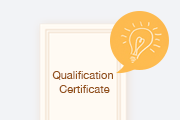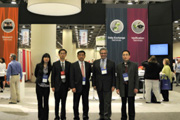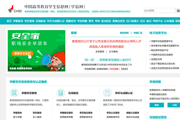-

National Student Clearinghouse04/09/2014
The National Student Clearinghouse (a nonprofit formed in 1993) is the trusted source for and leading provider of higher education verifications and electronic education record exchanges, handling more than 700 million verification requests and 250 million education record exchanges annually.
-

CollegeNET04/09/2014
CollegeNET, Inc. is a leading developer of web-based systems for higher education and nonprofit organizations, serving more than 1300 clients worldwide. The company helps improve efficiencies, reduce paper consumption and cut costs by providing advanced tools for managing resources, streamlining information, and better serving students and applicants.
-

China College Student Satisfaction Survey12/27/2013
Starting from October 2011, CHESICC began to carry out China College Student Satisfaction Survey to investigate students’ overall satisfaction, campus environment, campus life, educational quality, campus setting, and employment satisfaction, etc.
-

Digitalization of China Higher Education Student Information12/27/2013
Digitalization of China higher education student information started in the early 1990s. With the rapid popularization of PC, universities developed student information management software, but only for off-line system. In the late 90s, with the development of internet, networking of applied system became a trend. E.g. MOE made an experimental online college admission test in Tianjin in 1999, and then expanded to nationwide.
-

Qualifications and Degrees: Understanding the Chinese Dual-Credential System12/02/2013
Qualifications and Degrees: A Simplified Outline
-

How Qualification Registration Conducted11/21/2013
In China higher education qualification certificate (including Zhuanke, undergraduate, master, and doctoral levels) registration, there is a whole-process dynamic management, beginning with admission records, going with freshmen student record registration, then with in-school student annual registration, and finally leading to qualification registration, in which each step should be based on the prior one.
-

Gaokao Scores for Admission to Spanish Universities11/03/2013
China Education Expo 2013 opens in Beijing yesterday. As the guest country of honor, Spain has long been inferior to other European countries, such as UK, France and Germany, in appealing to international students.
-

Student Record and Qualification Verification in China08/15/2013
In China, there are 40 million records for students in school, and all higher education institutions register students on CHESICC’s platform. Study record and qualification verification are provided in different forms, including personal review, individual verification, member verification, batch verification, and web service or XML.
-

56,000 Qualification Certificates Verified Last Year08/14/2013
Institutes under Ministry of Education of China have verified over 56,000 Higher-education Qualification Certificates in 2012, in which fake certificates were 3%.
-

Qualification Certificate & Degree Certificate07/24/2013
In China, qualifications and degrees are two separate types of credentials represented by separate documents – Qualification Certificate and Degree Certificate respectively. Qualification, also named as diploma or graduation certificate, is a state-recognition of the holder’s education experience.
-

Introduction to Chinese Graduate Student Entrance System07/19/2013
Chinese Graduate Student Entrance Examination is a unified concept of some examinations organized by education departments or admissions institutions to select graduate students, which is the necessary examination for being a graduate in China (except a small number of exam-free recommendation students), just like taking the College Entrance Examination to enter a university.
-

CHESICC Delegation participated in the AACRAO's 99th Annual Meeting05/21/2013
AACRAO 99th Annual Meeting was held in April 14-17, San Francisco. There were experts of more than 2,400 high schools and related institutions from 36 countries taking part in this annual meeting. China Higher Education Student Information and Career Center (CHESICC) was invited. The list of staff going for this visit includes: ManKaijie(Director of verification Department of CHESICC) and ChengWeixing (Director of imformation Department of CHESICC)
-

Digitized Storage of Student Information Has Become a World Trend04/27/2013
How to apply for universities easily? How to identify true or false qualifications? How to define the authenticity of overseas qualifications obtained by students? These headaches, for students, colleges and enterprises, are expected to be solved by cooperation and communication through global digital student data depositories. Digitized storage of student information has become a world trend.
-

Official Launch: English Version of Online Verification System of HEQC11/07/2012
The ten-year anniversary of CHSI website and official unveiling ceremony of English version of Online Verification System of HEQC was held in Beijing on October 29th. Du Yubo, deputy minister of Education and Lin Huiqing, minister assistant of Education attended the event and unveiled the English website.
-

Introduction to Qualification Certificates in China03/15/2012
What is qualification level? "Qualification level" refers to the academic experience people gain in their scientific and cultural studies or skill trainings at educational institutions. Students attain corresponding qualification levels depending on the levels of the school or training they have attended. Higher education qualification certificates (abbreviated as HEQC in the following), are state recognized evidences of their holders having received higher education.
-

Online Registration of Qualification Certificates03/15/2012
In 2001 the Ministry of Education issued Interim Provisions on the Online Registration of Qualification Certificates of Higher Education Institutions (Jiaoxue [2001] 4): from 2001, the State begins to adopt the online registration of qualification certificates and any unregistered certificates shall not be recognized by the State; CHESICC was commissioned by the Ministry of Education to offer technical, transactional and online inquiry services related to the online registration, verification and recording of qualification certificates.
-

Database Resources03/15/2012
Commissioned by the Ministry of Education, CHESICC has established a national information database of student records and HEQCs for college students. By the end of 2011, the overall data has amounted to over 600 million, including:
-

China Higher Education Student Information (CHSI) Website03/15/2012
The website is sponsored by China Higher Education Student Information and Career Center (CHESICC) and run by Student Information Consulting Services Ltd., a company held by CHESICC. With an integrated database of college admissions, student records, qualification certificates, employment information and student loans
-

Introduction to China Higher Education Student Information and Career Center03/15/2012
China Higher Education Student Information and Career Center (CHESICC) is an institution directly under the Ministry of Education, specializing in college enrollments, student records, qualification certificates and employment information services for students of higher education institutions. Its predecessor was "National Career Center for College and University Students".